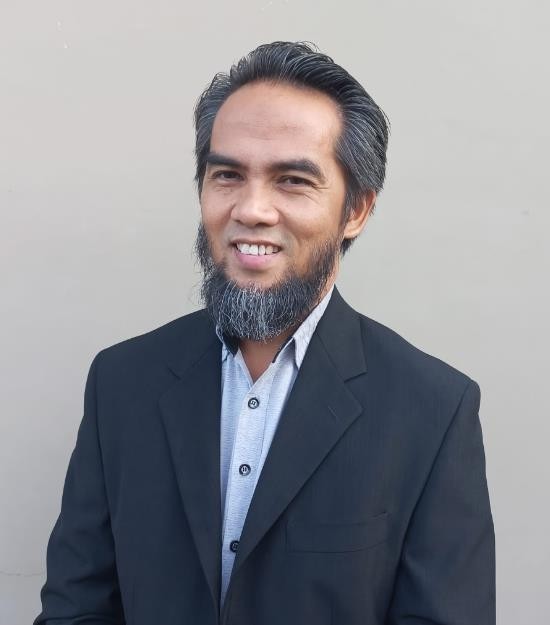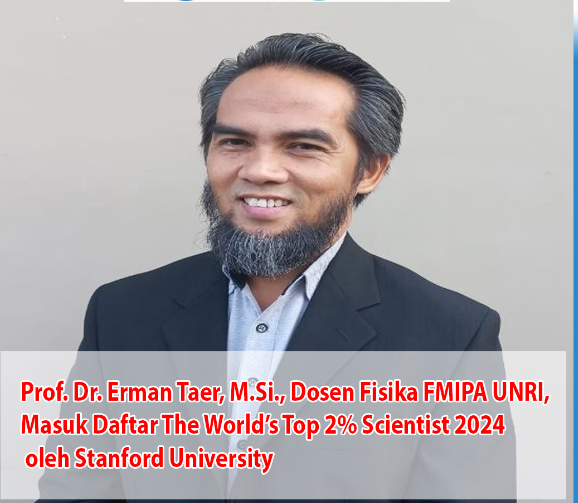Riau University (UNRI) has made another proud achievement through one of its best lecturers, Prof. Dr. Erman Taer, M.Si. He was included in the prestigious list of The World's Top 2% Scientist in 2024 by Stanford University. This achievement was achieved thanks to his extraordinary contribution in research in the field of carbon-based supercapacitors derived from biomass waste. This award further strengthens Prof. Erman's position as a leading scientist in Indonesia in the development of sustainable energy storage technology.

Prof. Erman Taer, who also serves as Head of the Physics Department at UNRI's Faculty of Mathematics and Natural Sciences (FMIPA), ranks 64th on Stanford University's list of Indonesia's top scientists in the world's Top 2% Scientists.
Every year, Stanford University publishes The World's Top 2% Scientist list which includes the most influential scientists in various disciplines around the world. The list is based on strict criteria, including the number of scientific publications indexed in international databases, the citation index, and the impact of the research conducted. Stanford uses data from Scopus, one of the largest scientific databases in the world, to calculate the scientific impact of each scientist. Stanford University recognizes researchers who contribute significantly to the development of global science. Prof. Erman's inclusion in this list shows how important his scientific works, especially in the field of material physics, are widely appreciated by the world academic community.
For more than a decade, Prof. Dr. Erman Taer, M.Si has focused on researching the development of supercapacitors-efficient and sustainable energy storage devices. Supercapacitors are a vital component in future energy technologies due to their ability to store large amounts of
store large amounts of power, have a long cycle life, and a fast charging process, making them superior to conventional batteries.
One of the hallmarks of Prof. Erman's research is the use of local biomass waste, particularly waste that is easily found in Indonesia, such as coconut shells, rice husks, and other plant fibers, to produce highly porous carbon materials. Carbon from this biomass waste is then processed into supercapacitor electrodes with excellent performance. This innovative approach not only offers an environmentally friendly energy solution, but is also able to add value to waste that has been wasted.
In his research, Prof. Erman and his team have successfully demonstrated that carbon produced from local biomass has a very competitive energy storage capacity. This carbon material has high porosity characteristics that allow capacitors to store large amounts of charge and release it quickly. More importantly, this approach is in line with the principle of sustainability, considering the environmentally friendly raw material sources and the more efficient production process.
Prof. Erman's research is very relevant in the global context, where the need for renewable and environmentally friendly energy sources is increasingly pressing. With the increasing global energy demand, especially for electric vehicle applications, portable electronic devices, and smart power grids, carbon-based supercapacitors from biomass waste offer a very potential solution.
This innovation in making carbon electrodes from biomass waste has received wide recognition among international scientists. Prof. Erman's scientific publications in reputable international journals often serve as important references for other researchers working in the same field. One of his leading research results published in a reputable journal shows that carbon material produced from coconut shells is able to produce higher capacitance compared to conventional carbon materials. This finding is very important for the development of large-capacity and efficient energy storage technology in the future.
Not only does it have a significant impact on the development of renewable energy technology, Prof. Erman's research also provides real benefits to society. The use of biomass waste as a raw material for carbon production opens up new economic opportunities, especially in rural areas in Indonesia, where agricultural and forestry waste is abundant but often not optimally utilized. With this technology, previously worthless waste can be processed into products that have high economic value, such as supercapacitors.
Prof. Erman is also committed to continuing to encourage sustainable and environmentally friendly research. The use of abundant local resources such as biomass as raw materials not only contributes to environmental conservation, but also supports the transition to a greener and more sustainable economy. This research is in line with the global agenda to reduce dependence on fossil fuels and develop clean energy technologies.
